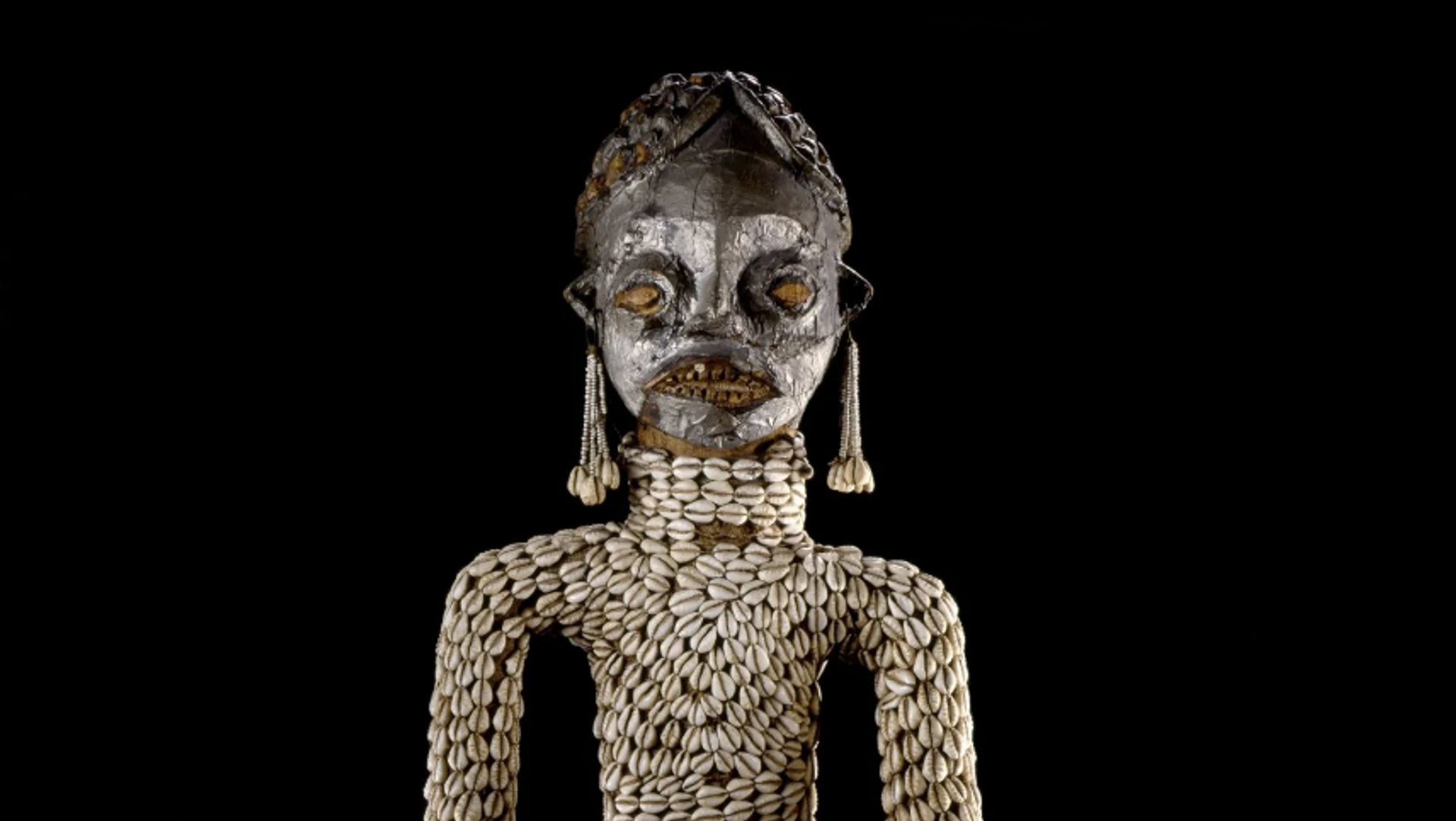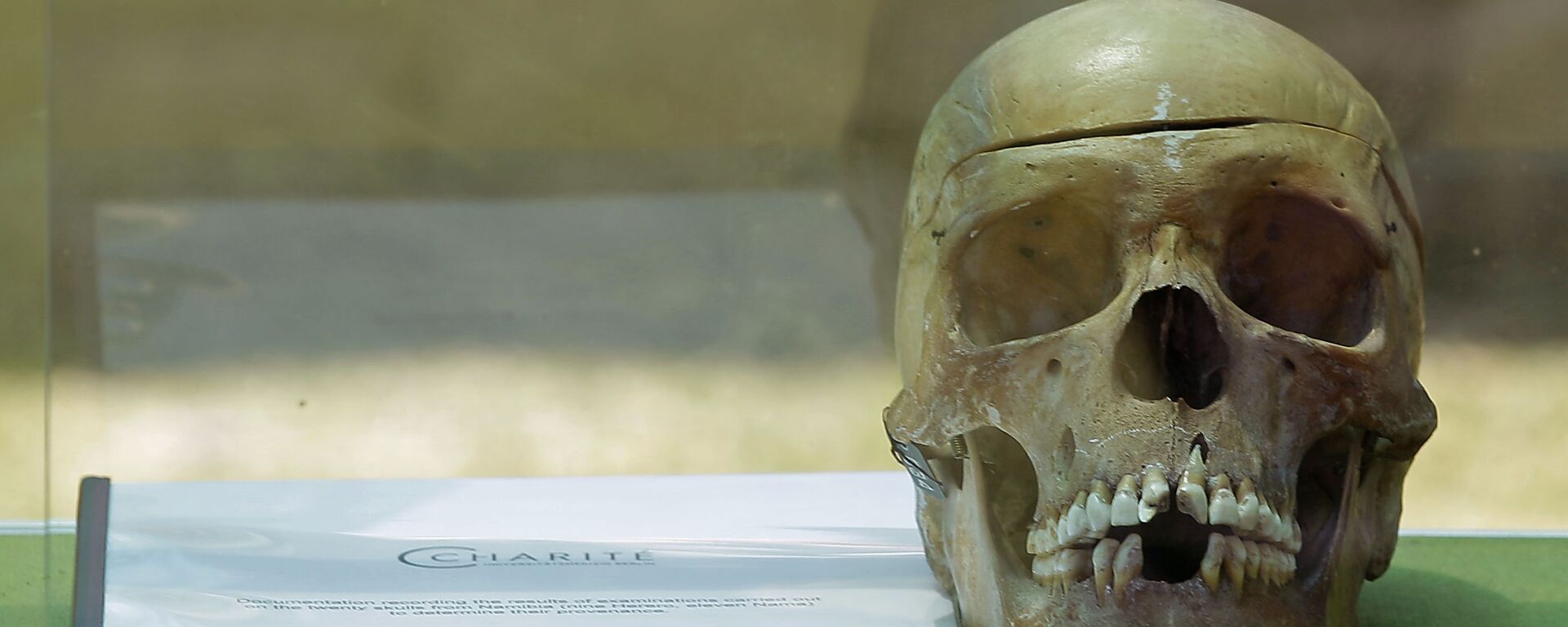https://sputnikglobe.com/20220628/germany-returns-artifacts-seized-during-colonial-rule-to-three-african-nations-1096771347.html
Germany Returns Artifacts Seized During Colonial Rule to Three African Nations
Germany Returns Artifacts Seized During Colonial Rule to Three African Nations
Sputnik International
German officials said on Monday that several artifacts taken from Africa during the country’s colonial era would be returned to the peoples from whom they were... 28.06.2022, Sputnik International
2022-06-28T23:27+0000
2022-06-28T23:27+0000
2022-06-28T23:27+0000
germany
colonialism
cameroon
https://cdn1.img.sputnikglobe.com/img/07e6/06/1c/1096771456_0:0:857:483_1920x0_80_0_0_7c8728b1d93768e5de21b09e90a60003.png
The announcement was handed down by the Prussian Cultural Heritage Foundation, which approved 24 objects for return, including jewelry, tools, and fashion items.Included on the list is the shell-studded statue of Ngonnso’, the mother goddess of the Nso’ people of northwestern Cameroon, which was “donated” to Berlin’s Ethnological Museum in 1903 by a German military officer.Also included were objects seized during the Maji Maji Rebellion, an anti-colonial upheaval that rocked German East Africa, a territory including modern-day Tanzania, Burundi and Rwanda, from 1905 to 1907. As many as 300,000 Africans were killed in Germany’s suppression of the uprising.In May, the museum announced it was sending 23 stolen artifacts to Namibia on long-term loan, but was not returning them outright. Berlin reached a deal last year to admit it committed genocide against Namibia’s Herero and Nama peoples from 1904 to 1908, when they rose up against German colonization and were driven off their land and into the desert as punishment. The deal includes a $1.4 billion payment to Namibia, but the descendants of those who survived have called it insufficient to right the wrongs committed.Germany has also pledged to send other artifacts back to Africa, including the famous Benin Bronzes, intricate sculptures taken from the Kingdom of Benin, which is today part of Nigeria, despite the existence of the country of Benin, which was a German colony.A study commissioned by the French government in 2018, another former major colonial power in Africa, found that more than 90% of African art is housed in museums outside the continent. However, even in Europe, much of the art pillaged by the Nazis in their continent-spanning wars in the 1930s and 1940s also has not been returned and continues to be traded.The news also comes as the remains of Patrice Lumumba, the architect of Congo-Kinshasa’s independence and the country’s first leader, were returned to the Democratic Republic of the Congo by Belgium, the former colonial ruler. Lumumba was assassinated by the US and Belgian governments in 1961 for his left-wing politics. His remains have been prepared for burial in Haut-Katanga for June 30, which is DR Congo’s independence day.
https://sputnikglobe.com/20210528/germany-to-pay-namibia-13bln-in-recognition-of-20th-century-genocide-1083014999.html
germany
cameroon
Sputnik International
feedback@sputniknews.com
+74956456601
MIA „Rossiya Segodnya“
2022
Sputnik International
feedback@sputniknews.com
+74956456601
MIA „Rossiya Segodnya“
News
en_EN
Sputnik International
feedback@sputniknews.com
+74956456601
MIA „Rossiya Segodnya“
Sputnik International
feedback@sputniknews.com
+74956456601
MIA „Rossiya Segodnya“
germany, colonialism, cameroon
germany, colonialism, cameroon
Germany Returns Artifacts Seized During Colonial Rule to Three African Nations
German officials said on Monday that several artifacts taken from Africa during the country’s colonial era would be returned to the peoples from whom they were taken. Last year, Berlin also signed a deal to make restitution payments to Namibia for the genocide committed there by German colonists in the early 20th century.
The announcement
was handed down by the Prussian Cultural Heritage Foundation, which approved 24 objects for return, including jewelry, tools, and fashion items.
“The decision makes clear that the issue of the return of items collected in a colonial context does not always come down to injustice,” foundation president Hermann Parzinger said in a statement. “The special significance – in particular spiritual – of an artifact for the community it originated from may also justify return.”
Included on the list is the shell-studded statue of Ngonnso’, the mother goddess of the Nso’ people of northwestern Cameroon, which was “donated” to Berlin’s Ethnological Museum in 1903 by a German military officer.
Also included were objects seized during the Maji Maji Rebellion, an anti-colonial upheaval that rocked German East Africa, a territory including modern-day Tanzania, Burundi and Rwanda, from 1905 to 1907. As many as 300,000 Africans were killed in Germany’s suppression of the uprising. In May, the museum announced it was
sending 23 stolen artifacts to Namibia on long-term loan, but was not returning them outright. Berlin reached a deal last year to
admit it committed genocide against Namibia’s Herero and Nama peoples from 1904 to 1908, when they rose up against German colonization and were driven off their land and into the desert as punishment. The deal includes a $1.4 billion payment to Namibia, but the descendants of those who survived have called it insufficient to right the wrongs committed.
Germany has also
pledged to send other artifacts back to Africa, including the famous Benin Bronzes, intricate sculptures taken from the Kingdom of Benin, which is today part of Nigeria, despite the existence of the country of Benin, which was a German colony.
A study commissioned by the French government in 2018, another former major colonial power in Africa, found that more than
90% of African art is housed in museums outside the continent. However, even in Europe, much of the art
pillaged by the Nazis in their continent-spanning wars in the 1930s and 1940s also has not been returned and continues to be traded.
The news also comes as the remains of Patrice Lumumba, the architect of Congo-Kinshasa’s independence and the country’s first leader, were returned to the Democratic Republic of the Congo by Belgium, the former colonial ruler.
Lumumba was assassinated by the US and Belgian governments in 1961 for his left-wing politics. His remains have been
prepared for burial in Haut-Katanga for June 30, which is DR Congo’s independence day.


